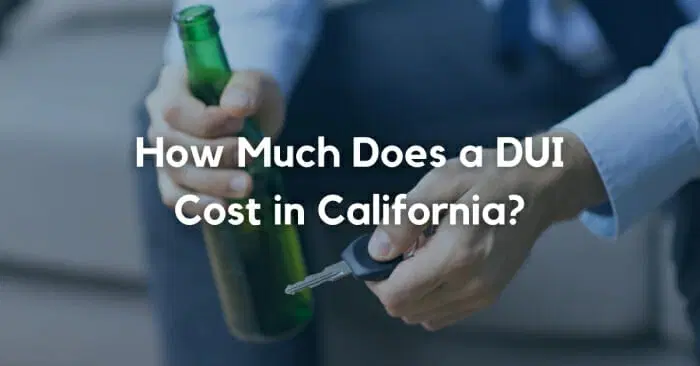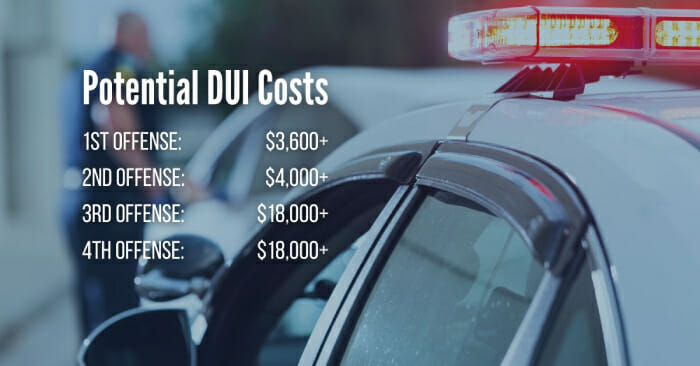
How Much Does a DUI Cost in California? (Calculate Yours Now)
Legally reviewed by: Jessica Anvar Stotz, JD, MBA
If you’d like to calculate what your recent DUI might cost, fill out the calculator questionnaire below to get an estimate.
According to data from the Judicial Council of California, the initial expenses of a DUI can be upwards of approximately $5,435. This figure includes various elements such as fines, legal fees, court costs, and expenses related to mandatory educational programs.
These immediate costs can be a sudden financial burden for anyone facing a DUI charge. The cumulative expenses related to a DUI can reach very high at a staggering $45,435.
Understanding the potential costs associated with a DUI charge can help you plan your course of action more effectively. Keep in mind that these figures are averages and your actual costs will vary based on unique circumstances. Use the calculator as a starting point to grasp the potential financial consequences and make informed decisions moving forward.
Average Cost of a DUI in Different California Cities
Looking for the average cost of a DUI in your city? Take a look at our chart below to get a gauge of your potential costs.
| City | First DUI Total | Criminal Fines |
| Los Angeles | $8,000 to $25,000 or more* | $390 to $1,000 |
| San Diego | $13,000 to $27,000 or more* | Up to $1,000 |
| San Francisco | $8,000 to $25,000 or more* | $390 to $1,000
|
| San Jose | $13,500 or more* | $390 to $1,000 |
| Fresno | $16,000 or more* | $390 to $1,000 |
| San Bernardino | $13,500 or more* | $1906* |
| Sacramento | $10,000-$16,000 or more* | $390 to $1,000
|
| Riverside | $13,500 or more* | $2,300* |
*These are approximate costs.
Frequently Asked Questions
What is the average cost of a first DUI in California?
A first-time DUI conviction in California entails a range of financial penalties and legal repercussions. For a misdemeanor DUI, fines can span from $390 to $1,000. This amount can increase significantly, up to $3,600 or more. Alongside potential fines, individuals could also face a jail sentence of up to 6 months.
Even more, a DUI conviction leads to driver’s license suspension. Criminal courts enforce a 6-month suspension, while the California DMV enforces a separate 4-month administrative suspension. Refusal of BAC testing results in a lengthier DMV suspension of 1 year. These suspension periods can coincide, and individuals may obtain a restricted license after a 30-day suspension, allowing limited driving for work or school purposes.
Probation following a first DUI typically lasting 3 years, potentially extending to 5 years depending on the situation. Part of probation involves attending a DUI school, where individuals complete a 3-month program comprising 30 hours of classes. If the blood alcohol concentration is 0.20% or higher, a more extensive 9-month program with 60 hours of classes becomes mandatory.
The average cost of a first DUI in California can vary depending on several factors, including the specific circumstances of the case, legal fees, fines, and associated expenses. If you are facing a DUI charge in California, it is advisable to consult with legal professionals who can provide you with personalized advice based on the specifics of your situation.
What is the average cost of a second DUI in California?
A second DUI conviction in California carries significant consequences and penalties that individuals must be aware of. The financial impact involves fines ranging from $390 to $1,000, along with additional penalty assessments that can run up the total fine to $4,000 or more.
Furthermore, a second DUI conviction can lead to a jail sentence of 1 year maximum. Criminal courts institute a 2-year suspension for a second DUI offense, while the California DMV enforces a separate 1-year administrative suspension for a DUI above the legal blood alcohol concentration (BAC) limit of 0.08% or higher.
When it comes to multiple suspensions, they can overlap, ensuring that individuals only endure the longest suspension period. Following an initial 90-day hard suspension, individuals might be eligible for a restricted license, permitting them to drive to and from work or school. If the DUI conviction involves driving while under the influence of a substance, the 90-day hard suspension extends to 1 year.
Probation for a second DUI charge can last 3 years, but potentially extended to 5 years depending on the circumstances. As part of probation, individuals are required to complete an 18 to 30-month DUI course, serving as an educational measure to prevent future offenses.
A DUI conviction typically mandates the installation of an ignition interlock device in the individual’s vehicle for at least one year. This device acts as a safeguard by requiring the driver to pass a breathalyzer test before the vehicle can be started.
What is the average cost of a third DUI in California?
A third DUI conviction in California brings about a heightened level of severity, characterized by intensified consequences and penalties. The financial obligations associated with a misdemeanor 3rd DUI are substantial, encompassing fines ranging from $300 to $1,000.
However, the impact is amplified by significant penalty assessments that can elevate the total to a staggering $18,000 or more, underscoring the gravity of the offense. Individuals convicted of a third misdemeanor DUI may face at least one year or more of jail time as punishment.
In a third DUI conviction, criminal courts will mandate a 3-year suspension, while the DMV enforces a 1-year administrative suspension for DUI convictions involving a blood alcohol level of 0.08% or higher. After a 6-month hard license suspension period, individuals may become eligible for a restricted license that permits controlled driving to and from work or school.
The probation duration for a third DUI ranges from 3 to 5 years. Defendants must undertake a comprehensive 30-month DUI course as a condition of their probation. Moreover, the consequences of a third DUI can extend to mandatory installation of an ignition interlock device on the offender’s vehicle for at least 2 years.
What is the average cost of a fourth DUI in California?
Repeated DUI offenses within a ten-year span carry escalated penalties, often resulting in felony charges. The financial ramifications of a fourth or subsequent DUI conviction can cost well over $5,000. This monetary burden is further compounded by substantial penalty assessments, potentially elevating the total cost to an alarming $18,000 or more.
The potential incarceration period for a fourth DUI conviction in California can be anywhere from 16 months to 3 years in state prison. License suspension for individuals convicted of a fourth or subsequent DUI can extend to 4 years maximum, with the possibility of a permanent license suspension.
Probation terms for a fourth DUI conviction remain consistent with prior offenses, ranging from 3 to 5 years. Defendants are mandated to successfully complete a comprehensive 30-month DUI school as a condition of probation. After a fourth DUI, offenders must have an ignition interlock device installed on their vehicle for at least 3 years.
A felony DUI conviction carries the weighty consequence of convicted felon status, leaving an indelible mark on an individual’s record. As such, we highly recommend for those facing such charges to seek guidance from an experienced DUI lawyer.

Which factors affect cost the most?
The cost of a DUI in California can be influenced by several factors, and some of the most significant factors that affect the cost include:
- Number of Prior Offenses: The cost of a DUI tends to increase with each subsequent offense. A fourth DUI offense is likely to incur higher fines, fees, and penalties compared to a first or second offense.
- Felony vs. Misdemeanor: Depending on the circumstances and prior convictions, a fourth DUI could be charged as a felony. Felony charges typically come with more severe penalties, including higher fines and potential prison time.
- Legal Fees: Hiring a DUI attorney to defend your case can significantly impact the cost. Complex cases or cases that go to trial may require more legal representation, leading to higher legal fees.
- Fines and Penalties: Fines for DUI convictions increase with each offense. Fourth-time DUI offenders can face substantial fines that can contribute significantly to the overall cost.
- Court Costs and Fees: Court-related fees, assessments, and administrative costs can add up, increasing the total financial burden.
- Ignition Interlock Device (IID): A fourth DUI conviction might require the installation and maintenance of an ignition interlock device in your vehicle. The cost of the IID, installation, and monthly fees can contribute to the overall expenses.
- DUI School: Fourth-time DUI offenders may be required to complete a longer DUI education program, which can lead to higher costs for enrollment and completion.
- Increased Insurance Premiums: DUI convictions often result in higher car insurance premiums for an extended period. The cost of increased insurance premiums can be substantial over time.
- Lost Earnings and Job Impact: Time spent dealing with legal proceedings, court appearances, and potential incarceration can result in lost wages. Additionally, a DUI conviction might affect your employment, leading to further financial consequences.
- Additional Consequences: If your DUI case involves accidents, property damage, injuries, or other aggravating factors, the associated costs could be higher.
- Location: The jurisdiction where your DUI case is handled can influence the fines, fees, and penalties imposed.
How much do insurance premiums increase after a DUI charge in California?
After a DUI charge in California, your insurance premiums are likely to increase significantly. The increase can vary depending on several factors, including the insurance company you are with and the specifics of your case.
On average, you can expect your rates to increase by around 185% per year after a DUI conviction. The increase in rates is due to the fact that insurance companies view drivers with a history of DUI as riskier to insure, as they are more likely to file claims.
The duration for which a DUI affects your insurance rates can vary. Insurers typically look at the past 3-5 years on a driver’s motor vehicle record when calculating premiums, but some may consider violations like DUI even further back. A DUI in California can affect insurance rates for up to 10 years, depending on how far back the insurance company checks your driving record.
Pros and Cons of Hiring Legal Help vs. Fighting a DUI Charge Yourself
| Aspect | Attorney | Public Defender | Self-Representation |
| Legal Expertise | Pros: | Pros: | Pros: |
| – Specialized DUI defense knowledge | – Legal expertise in criminal defense | – No legal fees | |
| – Experience with local laws | – Familiarity with local court system | – Direct control over your defense | |
| – Better access to resources and experts | – No cost (for qualifying defendants) | ||
| Cons: | Cons: | Cons: | |
| – Can be expensive | – Heavy caseload, limited time to devote to each case | – Lack of legal expertise | |
| – May not be available for court-appointed cases | – Potential limited negotiation power with busy schedule | – Complex legal procedures may be challenging | |
| – Some attorneys may lack DUI specialization | – Less time to fully investigate your case | – Emotional bias | |
| – Additional fees for extra services (e.g., expert witnesses) | – Public defenders may be less experienced | ||
| Time and Attention | Pros: | Pros: | Pros: |
| – Dedicated time and attention to your case | – Potential for more one-on-one time with your case | – No need to coordinate with anyone else | |
| – Better case preparation | – Familiarity with local court procedures | – Flexibility to choose your defense strategy | |
| – Ability to navigate complex legal procedures | – May have a smaller caseload | ||
| Cons: | Cons: | Cons: | |
| – Costly | – Limited resources | – Time-consuming | |
| – Not all attorneys are equally dedicated | – May have heavy workload | – Steeper learning curve on legal matters | |
| – May have less experience with DUI cases | – Increased risk of making legal mistakes | ||
| Negotiation and Plea Bargaining | Pros: | Pros: | Pros: |
| – Skilled in plea bargaining and reducing charges or penalties | – Experience with plea negotiations | – Complete control over negotiations | |
| – Knowledge of alternative sentencing options | – Familiarity with prosecutors and judges | – Direct communication with the court | |
| Cons: | Cons: | Cons: | |
| – Possible limited rapport with prosecutors | -Public defenders may have less time to negotiate | – Limited Negotiation experience and expertise | |
| – Not all attorneys are equally dedicated | – May not have as much leverage as private attorneys | – Higher chance of unfavorable plea deals | |
| Trial Representation | Pros: | Pros: | Pros: |
| – Strong trial representation | – Familiarity with courtroom procedures | – Direct control over your defense | |
| – Knowledge of evidence and cross-examination | – May have worked with local law enforcement officers before becoming a public defender | – Opportunity to present your case as you see it | |
| – Ability to challenge witnesses | |||
| Cons: | Cons: | Cons: | |
| – Can be costly | – Heavy workload, limited time to dedicate to each case | – Legal procedures can be complex | |
| – Trial preparation requires time and resources | – Less experience with trial representation | – Lack of trial experience | |
| – Outcomes may not be guaranteed despite effort | – Emotional bias |
Representing yourself in a DUI case can be particularly challenging due to the complex legal procedures and potential consequences involved. If you need to defend yourself against a DUI charge, you should consult with legal professionals to better understand your options and how to best settle your case.
In situations like these, leveraging available resources can greatly enhance your legal strategy. Consider exploring LawLinq, our lawyer referral service that connects individuals with exceptional attorneys specializing in cases like yours throughout California. The best part is our service comes at no cost or obligation to you.
Through LawLinq, you can receive tailored guidance from experienced criminal defense attorneys who have a deep understanding of DUI laws and proceedings. This step can offer you a clear assessment of the potential advantages and disadvantages associated with each course of action available in your case.
With the support and expertise of our skilled attorneys, you can make informed decisions that are well-suited to your unique situation. Contact us for more information on how to get started today.


